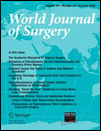Factors Predicting the Hospital Mortality of Patients with Corrosive Gastrointestinal Injuries Receiving Esophagogastrectomy in the Acute Stage
S.-H. Chou and Y.-T. Chang contributed equally to this work.
Abstract
Objectives
The aim of this study was to identify the preoperative factors that affect the survival of patients who undergo esophagogastrectomy after corrosive ingestion, using analysis of their physiological condition, associated diseases, physical examination, and laboratory data.
Methods
Between January 1995 and December 2005, 71 consecutive patients who underwent esophagogastrectomy for corrosive ingestion injuries were retrospectively reviewed. Of them, 41 survived and 30 (42.3%) died during the perioperative period. Logistic regression analyses were used to model markers for postoperative mortality, including descriptive data, clinical symptoms/signs, and laboratory data.
Results
There were 35 males and 36 females included in the study, with an average age of 54.7 ± 14.9 years. After adjustments in the logistic regression model, age of over 65 years (p = 0.021), presence of gross hematuria (p = 0.016), twofold level of serum AST (p = 0.012), blood pH level below 7.2 (p = 0.017), and deficit of blood base over 16 (p = 0.007) were found to be independent risk factors for patient mortality.
Conclusions
We consider age over 65 years, preoperative pH < 7.2, base deficit >16, twofold level of serum AST, and presence of gross hematuria to be the important factors predicting postoperative hospital mortality in patients presenting with corrosive ingestion injuries who require emergency surgery.




